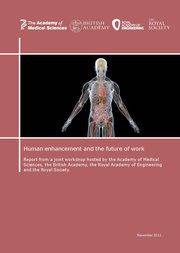Human enhancement and the future of work
by The British Academy, Academy of Medical Sciences, Royal Academy of Engineering and the Royal Society.

- Year
- 2012
- Number of pages
- 72
Summary
Human enhancement and the future of work summarises technological advancements that could dramatically change how people work over the next decade. These technologies, such as cognitive enhancing drugs, bionic limbs and retinal implants, affect various human capacities such as memory, hearing and mobility. The report explores how, although human enhancement technologies might aid society, their use could raise serious ethical, philosophical, regulatory and economic issues that will need further consideration.
To date, physical and cognitive enhancements have been developed primarily with the focus of restoration of function but increasingly drugs and enhancers are being used by healthy people. For example, Modafinil - a drug prescribed to treat sleep disorders has also been used to reduce impulsive behaviour. Researchers from Massachusetts College of Liberal Arts previously estimated that up to 16% of students in the USA use cognitive enhancers to improve performance, and that even some academics make use of enhancers to overcome jetlag and improve productivity for particularly challenging tasks.
Future advances in technology could result in a wide array of cognitive and physical enhancers being used by healthy people. For example, visual enhancement technologies, such as retinal implants, could be used in the military, for night watchmen, safety inspectors or gamekeepers. Enhanced night vision and the extension of the range of human vision to include additional wavelengths, could even come into play.
The report emphasises that there will be a need for further discussion and debate around issues such as potentially harmful new technologies, individuals feeling coerced into using enhancements, employee wellbeing, how the introduction of some technologies may be funded, and concerns related to equity and fairness. It is clear that a cross disciplinary approach will be needed to get a better understanding of how best to proceed. Scientists and engineers will need to work together with social scientists, philosophers, ethicists, policy-makers and the public to ensure that the benefits are realised while the risks are minimised.
This is the first example of our four academies combining our expertise to consider the policy implications of developments in a diverse range of research fields. The report captures the themes and questions that emerged from the workshop and does not necessarily represent the views of the four host academies.
Chair: Professor Genevra Richardson CBE FBA (Chair)
Steering group: Professor Paul Edwards FBA, Dr Robin Lovell-Badge FRS FMedSci, Mr Phil Newman, Professor Barbara Sahakian FMedSci, Professor Nigel Shadbolt FREng, Professor Jonathan Wolff.
More information on the joint academies' project on human enhancement and the future of work